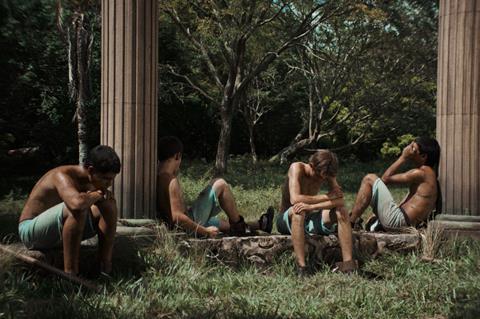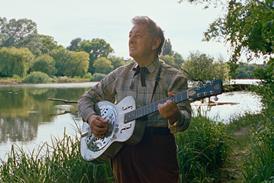A potent look at Latin American gang culture set deep in the Colombian jungle

Dir/scr: Andrés Ramirez Pulido. Colombia/France. 2022. 86 mins
‘You can take the boy out of the violence, but you can’t take the violence out of the boy’ might be the tagline for Andrés Ramirez Pulido’s striking feature debut La Jauría, playing in Cannes Critics’ Week. Exploring with compassion and intelligence the consequences of its intriguing initial setup — a reform school for young offenders set deep in the Colombian jungle, far from the scenes of their crimes — the film mashes up potent atmospherics with thriller and classical tragedy elements into a brooding, troubling whole, supplying a fresh, sensitive and thoughtful perspective on the cinema of Latin American gang culture.
The performances, largely by non-professionals, are functional more than memorable
Opening scenes show teenagers Eliu (Jhojan Estivez Jimenez) and Mono (Maicol Andrés Jimenez) abducting a victim at night and dumping his body: so far, so Latin American teen gang drama. But then suddenly, following one of the ellipses that are a stylistic trademark of the film, we are with Eliu and a couple of other inmates in a jungle compound where they are undergoing what seems to be a social experiment, a hybrid of punishment, in the form of physical labour, and rehabilitation.
Overseeing the process are Alvaro (Miguel Viera), who leads the boys in strange ritualistic incantations and breathing therapy, and the more traditional Godoy (Diego Rincón), a huge man whose authority is imposed simply through the rifle he wields. (The Spanish title translates as ‘The Pack’, but it soon becomes clear that the phrase refers not only to the inmates, but to their overseers as well.)
“We all prefer our Mums to our Dads,” one young offender comments, an old Oedipal truth that might be the heart of a film where sadly there seem to be no mothers on hand. It emerges that Eliu and Mono had indeed been intending to kill Eliu’s father — his hatred of his old man is written all over his sullen, sulking expression from beginning to end — but have accidentally murdered the wrong guy. One striking sequence of many has Eliu taking the dead man’s family to find the body only to find that it has disappeared: an apparently mystical event tossed into this otherwise straightforwardly told tale.
This would-be reform school is a fragile institution from the outset, and sure enough, following the arrival of new inmates, including Mono, things start to fall apart. Among other things, it becomes clear that the borderline crazy Álvaro is using the boys as vehicles for his own redemption, and that everyone except him believes that his methods will change nothing. Over the last half hour, the violence that has largely been held in check explodes in a series of episodes that follow one another a little too breathlessly, given the measured pace of things so far.
Several of La Jauría’s sequences linger in the memory. One, has Eliu, part of whose rehab is to work for his overseers, coolly ticking off boxes on a piece of paper as new arrivals duly confirm or reject his assertions that they are, for example, thieves, drug addicts or murderers or just plain bastards. The camera is heartbreakingly trained on the inmates’ fresh faces as they respond: this is their official identity. The conversations between the inmates are similarly striking, as they flatly exchange details of the most explosive cocktail of drugs they have taken. (For connoisseurs, the winner is clonazepam dissolved in brandy.)
La Jauría further explores the themes of Ramirez Pulido’s 2017 Cannes selected short Damiana, which similarly dealt with the invigilation of troubled youngsters in a jungle setting. Going one step beyond movies that blame society in general for the creation of 14-year-old thieves and killers, the director takes their existence as a given in Colombian society and instead asks: how can we best deal with the problem we have created? With understanding, or with more violence? How can we create families for people who don’t truly know what the word ‘family’ even means? And more broadly, why must we hate our fathers? By the end, La Jauría, which handles these big questions with naturalness and without even a hint of pretentiousness, has delivered a pretty clear answer, and sadly, it is not good news.
The performances, largely by non-professionals, are functional more than memorable — Mono, with his ever-present sardonic smile, and the tragicomic Alvaro, are the fullest-drawn characters. The sound design combines the natural noises of the jungle with electronic hums and rumbles to ominous effect, while Balthazar Lab’s camerawork exploits to the full the stagnant pools, thick foliage and dappled light of the jungle as the boys hack away at tree trunks, symbolically trying to tame a nature which, like their own, cannot finally be pacified.
Production companies: Valiente Gracia, Alta Rocca Films
International sales: Pyramide International, sales@pyramidefilms.com
Producers: Jean-Etienne Brat, Lou Chicoteau, Andrés Ramirez Pulido
Art direction: Johanna Agudelo Susa
Editing: Julie Duclaux, Juliette Kempf
Cinematography: Balthazar Lab
Music: Pierre Desprats
Main Cast: Jhojan Estiven Jimenez, Maicol Andrés Jimenez, Miguel Viera, Diego Rincon
























